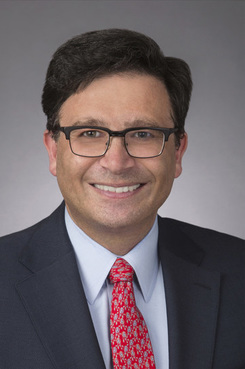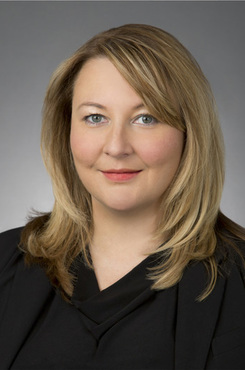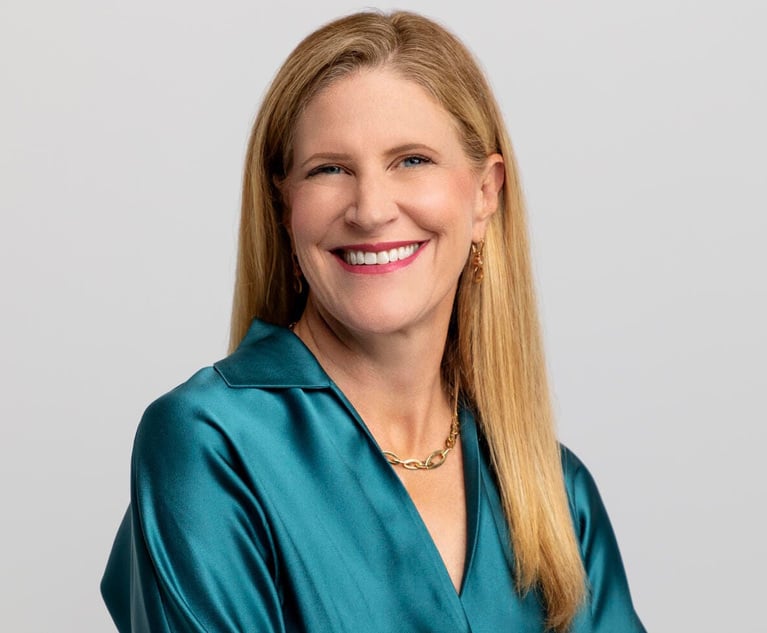Akin Gump Health Care Leaders Share 4 Important Trends for 2018
An FDA guru and senior policy adviser at Akin Gump Strauss Hauer & Feld explain what's to come in the health care space 2018.
January 08, 2018 at 03:02 PM
5 minute read

In the health care space, 2017 was a year of uncertainty.
And while 2018, which was ushered in with the repeal of the Affordable Care Act's individual mandate, may ultimately turn out to be just as chaotic, there are at least four general trends that will likely inform developments in the industry.
Corporate Counsel spoke with a couple of health care whizzes in the Washington, D.C., office of Akin Gump Strauss Hauer & Feld about what in-house lawyers within the industry should keep in mind in the new year, and beyond.
The comments from Howard Sklamberg, a former top Food and Drug Administration official who last fall joined Akin Gump as a partner in the health care and life sciences practice, and Heide Bajnrauh, senior policy adviser at the firm, have been edited for length and clarity
1. Sustained FDA Enforcement
Howard Sklamberg: In the enforcement area, one of the things people wondered before FDA Commissioner [Dr. Scott] Gottlieb took office [in May 2017] is, 'What would his posture on enforcement be?' This is something that only time would tell.
He's only been commissioner for about eight months, and he's certainly embraced the role of enforcement in public health. He's talked about fraudulent therapies. He's talked about the need for enforcement in dangerous imports, and he's proceeded with the reorganization of the Office of Regulatory Affairs, which works on enforcement. He certainly has set as a priority for the FDA, quite directly, the importance of enforcement and the link between enforcement and public health.
I would say that if companies thought that there was going to be a pullback on FDA enforcement, I think that would be an incorrect assumption. Now enforcement always changes, so [the FDA] may increase enforcement in one area, decrease it in another, but Gottlieb has affirmatively said that enforcement is important for public health and that enforcement is an important function.
2. Reduced Regulatory Burdens Through Increased FDA Pre-Certification Programs
Howard Sklamberg: There's a thrust in a lot of what Commissioner Gottlieb and the FDA are doing to look for companies that they can pre-certify and trust and then not make those companies jump through the same hoops over and over again. That's an important step that can be replicated in many different areas in the FDA.
You see this sort of thing, coming up with an objective way of saying, 'This is a company that the FDA, based on its record, trusts,' and then reducing the regulatory pathway—as a common move across the commodities. For example, even in food safety, there is a program for trusted importers of food.
I think we're going to see in the future a lot more versions of trusted company programs, whether it's pre-certification or other similarities. Companies would want to be ready for that when pilot programs are announced and be ready to have a record to show that they should be among that list. Of course, as trusted programs expand, it becomes more important to be in that group.
 Heide Bajnrauh.
Heide Bajnrauh. 3. Continued Policy Setting Through Rulemaking
Heide Bajnrauh: I certainly think that we're going to continue to see more changes happening through rulemaking. Some broader policy issues that we normally have not seen coming out of the Centers for Medicare & Medicaid Services through regulations, we are now seeing more and more, so that trend will certainly continue.
Before, people have just skimmed all of those thousand-page rules, but I think more and more, we're going to have to really start reading line-by-line to see actually what that full impact will be for policy-making purposes.
4. Heightened Emphasis on Increased Quality
Bajnrauh: I do think that there will still continue to be arrangements for value-based payment models , [which reward health care providers with incentive payments for the quality of care they give to people with Medicare]. It will not be as mandatory, as it was in the past, but because it's going to be more voluntary, there are two schools of thought: One is that there will be more flexibility as to what type of payment models CMS will want to pursue. From an economic standpoint, however, if you don't have everyone included, then that can skew the numbers, which could skew whether or not a pilot would have been successful or not on a national or broader scale.
I do think that there are still some concerns there. There is also just a re-evaluation of these types of value-based payment models because there aren't specific savings that people are pointing to. That still remains to be seen. Given that a lot of them have not been as transparent as before, there are still some questions as to what those savings are. I believe that will continue, but the focus on increasing quality will still be a priority for CMS.
This content has been archived. It is available through our partners, LexisNexis® and Bloomberg Law.
To view this content, please continue to their sites.
Not a Lexis Subscriber?
Subscribe Now
Not a Bloomberg Law Subscriber?
Subscribe Now
NOT FOR REPRINT
© 2025 ALM Global, LLC, All Rights Reserved. Request academic re-use from www.copyright.com. All other uses, submit a request to [email protected]. For more information visit Asset & Logo Licensing.
You Might Like
View All
Former Capital One Deputy GC Takes Legal Reins of AIG Spinoff

Khan Defends FTC Tenure, Does Not Address Post-Inauguration Plans

Apple Disputes 'Efforts to Manufacture' Imaging Sensor Claims Against iPhone 15 Technology
Trending Stories
Who Got The Work
Michael G. Bongiorno, Andrew Scott Dulberg and Elizabeth E. Driscoll from Wilmer Cutler Pickering Hale and Dorr have stepped in to represent Symbotic Inc., an A.I.-enabled technology platform that focuses on increasing supply chain efficiency, and other defendants in a pending shareholder derivative lawsuit. The case, filed Oct. 2 in Massachusetts District Court by the Brown Law Firm on behalf of Stephen Austen, accuses certain officers and directors of misleading investors in regard to Symbotic's potential for margin growth by failing to disclose that the company was not equipped to timely deploy its systems or manage expenses through project delays. The case, assigned to U.S. District Judge Nathaniel M. Gorton, is 1:24-cv-12522, Austen v. Cohen et al.
Who Got The Work
Edmund Polubinski and Marie Killmond of Davis Polk & Wardwell have entered appearances for data platform software development company MongoDB and other defendants in a pending shareholder derivative lawsuit. The action, filed Oct. 7 in New York Southern District Court by the Brown Law Firm, accuses the company's directors and/or officers of falsely expressing confidence in the company’s restructuring of its sales incentive plan and downplaying the severity of decreases in its upfront commitments. The case is 1:24-cv-07594, Roy v. Ittycheria et al.
Who Got The Work
Amy O. Bruchs and Kurt F. Ellison of Michael Best & Friedrich have entered appearances for Epic Systems Corp. in a pending employment discrimination lawsuit. The suit was filed Sept. 7 in Wisconsin Western District Court by Levine Eisberner LLC and Siri & Glimstad on behalf of a project manager who claims that he was wrongfully terminated after applying for a religious exemption to the defendant's COVID-19 vaccine mandate. The case, assigned to U.S. Magistrate Judge Anita Marie Boor, is 3:24-cv-00630, Secker, Nathan v. Epic Systems Corporation.
Who Got The Work
David X. Sullivan, Thomas J. Finn and Gregory A. Hall from McCarter & English have entered appearances for Sunrun Installation Services in a pending civil rights lawsuit. The complaint was filed Sept. 4 in Connecticut District Court by attorney Robert M. Berke on behalf of former employee George Edward Steins, who was arrested and charged with employing an unregistered home improvement salesperson. The complaint alleges that had Sunrun informed the Connecticut Department of Consumer Protection that the plaintiff's employment had ended in 2017 and that he no longer held Sunrun's home improvement contractor license, he would not have been hit with charges, which were dismissed in May 2024. The case, assigned to U.S. District Judge Jeffrey A. Meyer, is 3:24-cv-01423, Steins v. Sunrun, Inc. et al.
Who Got The Work
Greenberg Traurig shareholder Joshua L. Raskin has entered an appearance for boohoo.com UK Ltd. in a pending patent infringement lawsuit. The suit, filed Sept. 3 in Texas Eastern District Court by Rozier Hardt McDonough on behalf of Alto Dynamics, asserts five patents related to an online shopping platform. The case, assigned to U.S. District Judge Rodney Gilstrap, is 2:24-cv-00719, Alto Dynamics, LLC v. boohoo.com UK Limited.
Featured Firms
Law Offices of Gary Martin Hays & Associates, P.C.
(470) 294-1674
Law Offices of Mark E. Salomone
(857) 444-6468
Smith & Hassler
(713) 739-1250







